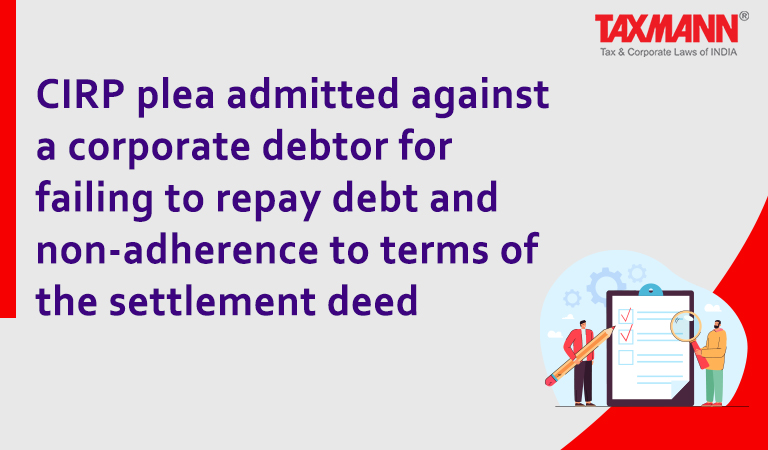CIRP plea admitted against a corporate debtor for failing to repay debt and non-adherence to terms of the settlement deed
- Blog|News|Insolvency and Bankruptcy Code|
- 2 Min Read
- By Taxmann
- |
- Last Updated on 21 December, 2021

Case Details: DBS Bank Ltd. v. Hindusthan National Glass & Industries Ltd. - [2021] 133 taxmann.com 179 (NCLT - Kolkata)
Judiciary and Counsel Details
-
- Rajasekhar V.K., Judicial Member and Harish Chander Suri, Technical Member
- Vikram Wadehra and Vidushi Chokhani, Advs. for the Appellant.
- Jishnu Saha, Sr. Adv., Kuldip Mallik and Ms. Labanyasree Sinha, Advs. for the Respondent.
Facts of the Case
In the instant case, the financial creditor was one of the lenders of a consortium comprising 12 Bankers/Lenders, who lent and advanced money and granted ECB loan facility to the corporate debtor on specific terms and conditions and compliance mentioned therein. The security offered by the corporate debtor was pari passu first charge on Fixed Assets (Movable Immovable Assets) of the borrower both present and future.
Corporate Debtor continued to be in distress both commercially and financially for a few years and could not service its debt obligation towards its lenders. Hence, it was declared as Non-Performing Asset (NPA). Consequently, an application was filed by a financial creditor under section 7 of IBC seeking initiation of corporate insolvency resolution process against the corporate debtor.
The corporate debtor submitted that it had been in discussion with lenders to formulate an effective resolution plan to pay off outstanding dues phase-wise, and said settlement plans were following schemes promulgated by the Reserve Bank of India from time to time. However, the corporate debtor had not been able to adhere to the terms of the settlement deed despite repeated opportunities granted by the financial creditor.
NCLT Held
During the hearing, the NCLT observed that the financial creditor proposed giving the corporate debtor further time without any written instructions from the financial creditor, which was against the pleadings placed on record by the financial creditor. In these circumstances, the financial creditor was asked to withdraw the application because, as per the provisions of section 7 and other relevant provisions and, ongoing through the pleadings of both the parties, no other time could be granted, and the petition deserves to be admitted.
Since no instructions or application has been filed for withdrawal of the present application, given the parties’ pleadings and documents placed on record, the application filed by the financial creditor under section 7 for initiating the Corporate Insolvency Resolution Process against the corporate debtor was admitted. A moratorium is declared and public announcement is made about such and the supply of essential goods or services rendered to the corporate debtor as may be specified shall not be terminated, suspended, or interrupted during the moratorium period.
Disclaimer: The content/information published on the website is only for general information of the user and shall not be construed as legal advice. While the Taxmann has exercised reasonable efforts to ensure the veracity of information/content published, Taxmann shall be under no liability in any manner whatsoever for incorrect information, if any.

Taxmann Publications has a dedicated in-house Research & Editorial Team. This team consists of a team of Chartered Accountants, Company Secretaries, and Lawyers. This team works under the guidance and supervision of editor-in-chief Mr Rakesh Bhargava.
The Research and Editorial Team is responsible for developing reliable and accurate content for the readers. The team follows the six-sigma approach to achieve the benchmark of zero error in its publications and research platforms. The team ensures that the following publication guidelines are thoroughly followed while developing the content:
- The statutory material is obtained only from the authorized and reliable sources
- All the latest developments in the judicial and legislative fields are covered
- Prepare the analytical write-ups on current, controversial, and important issues to help the readers to understand the concept and its implications
- Every content published by Taxmann is complete, accurate and lucid
- All evidence-based statements are supported with proper reference to Section, Circular No., Notification No. or citations
- The golden rules of grammar, style and consistency are thoroughly followed
- Font and size that’s easy to read and remain consistent across all imprint and digital publications are applied



 CA | CS | CMA
CA | CS | CMA
